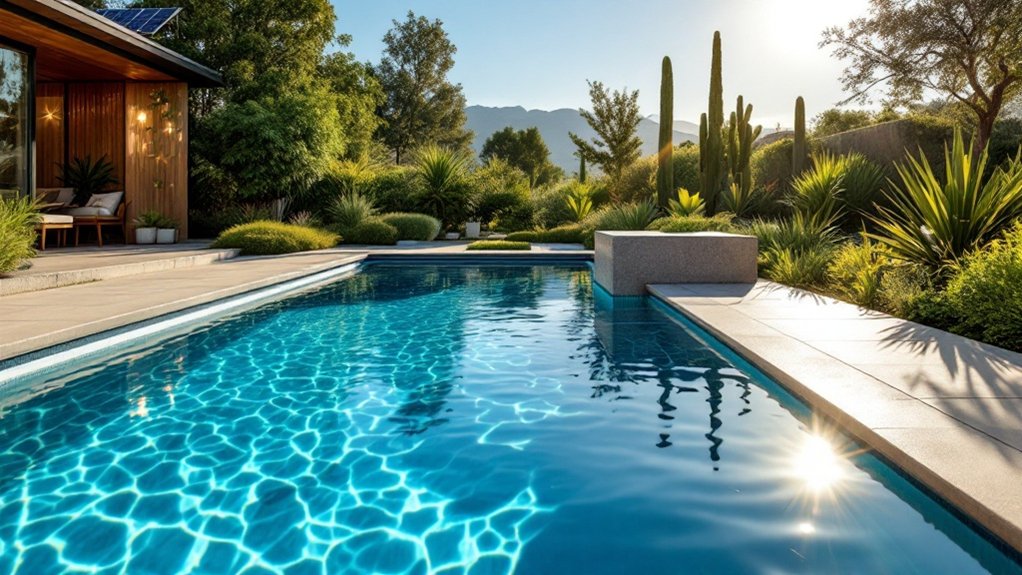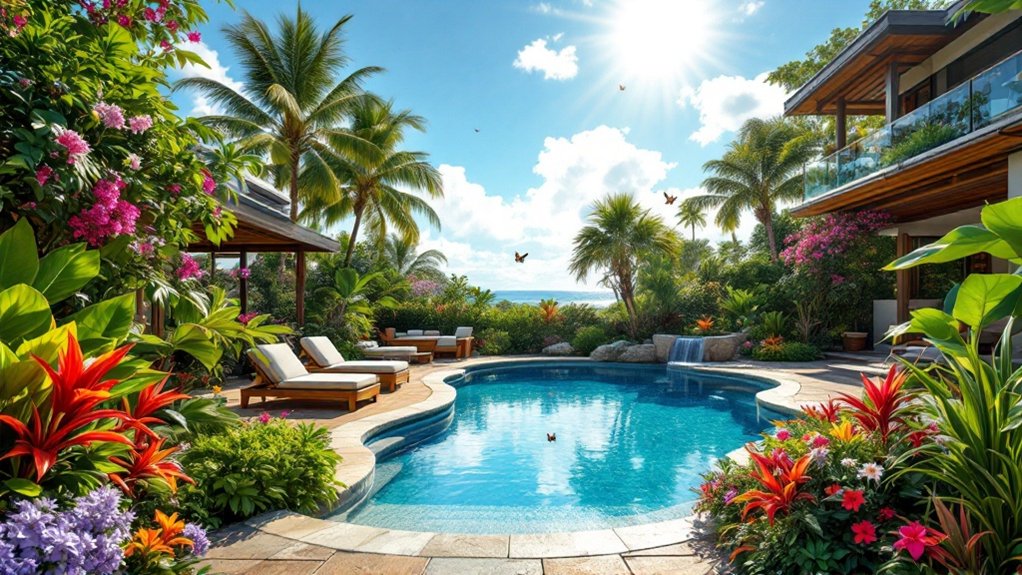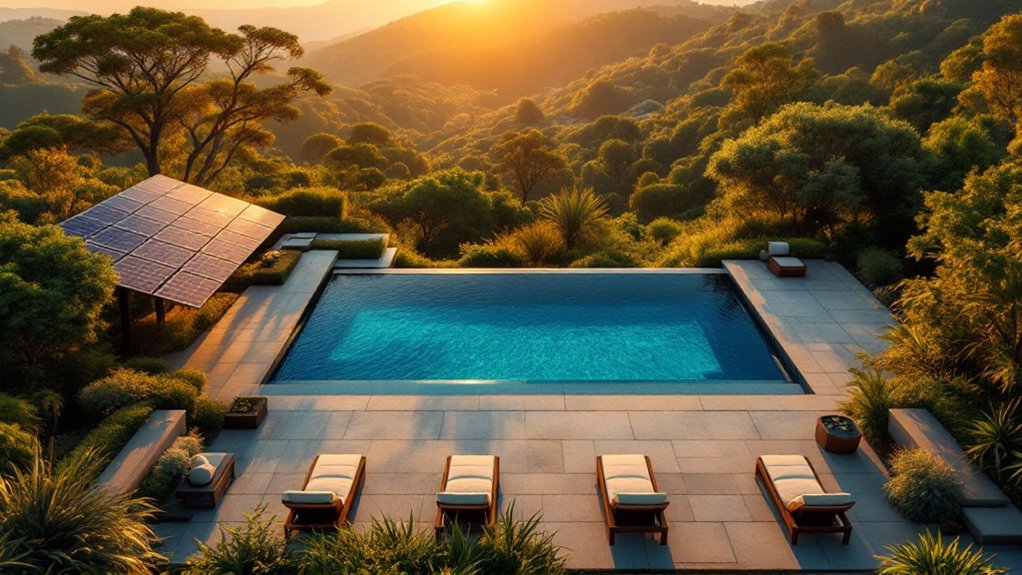The increasing awareness of environmental sustainability has prompted a shift in pool management practices. Innovative water-saving techniques are now at the forefront of this movement. Solutions such as rainwater harvesting, advanced pool covers, and smart monitoring systems are proving effective. These methods not only conserve water but also enhance energy efficiency. Exploring these strategies reveals a growing commitment to eco-friendly pool ownership and management, raising questions about the future of sustainable aquatic spaces.
Rainwater Harvesting Systems
Although many pool owners may overlook the potential of rainwater, harvesting systems offer an effective way to conserve water for pool maintenance. These systems capture and store rainwater from rooftops and other surfaces, providing a sustainable alternative to municipal water sources. By integrating a rainwater collection system, pool owners can appreciably reduce water costs and lessen their environmental impact. The collected rainwater can be utilized for various purposes, including filling the pool, maintaining water levels, and even for cleaning. Additionally, using rainwater helps mitigate stormwater runoff and reduces the burden on local drainage systems. As awareness of sustainable practices grows, more pool owners are recognizing the advantages of rainwater harvesting, leading to increased interest and adoption of these systems in pool maintenance routines.
Advanced Pool Cover Technology
Rainwater harvesting systems provide one method for pool owners to conserve resources, but advanced pool cover technology offers another innovative solution. These covers are designed to minimize evaporation, greatly reducing water loss. Made from durable materials, they can be automated for convenience and efficiency, ensuring that pools remain covered when not in use. Additionally, some advanced covers incorporate thermal insulation, helping to maintain water temperature and reduce heating costs. Other models feature solar panels that harness sunlight to power pool systems, enhancing energy efficiency. By investing in such technology, pool owners can effectively lower their water and energy consumption, contributing to a more sustainable approach to pool maintenance while also enjoying the benefits of reduced operational costs.
Efficient Filtration and Pumping Solutions
Efficient filtration and pumping solutions play an essential role in maintaining pool water quality while minimizing water waste. Advanced filtration systems, such as sand or cartridge filters, effectively remove debris and contaminants, reducing the frequency of water replacements. Variable-speed pumps are another vital innovation, allowing for tailored water circulation that matches the pool’s specific needs. These pumps consume considerably less energy compared to traditional single-speed models, which helps lower operational costs and carbon footprints. Additionally, some systems incorporate UV or ozone purification methods, which further enhance water sanitation without excessive chemical use. By investing in these efficient technologies, pool owners can guarantee clean, safe swimming environments while promoting sustainable practices in water management. Moreover, upgrading to energy-efficient systems can significantly reduce utility costs while improving overall performance.
Smart Pool Monitoring Systems
Smart pool monitoring systems offer advanced features that enhance water conservation efforts. With automated water level control, these systems maintain ideal water levels, reducing waste caused by evaporation and overfilling. Additionally, real-time water quality monitoring guarantees that chemical levels are balanced, minimizing the need for excessive water changes.
Automated Water Level Control
Automated water level control systems represent a significant advancement in pool management technology. These systems utilize sensors and advanced algorithms to monitor and maintain ideal water levels in swimming pools. By automatically adjusting water intake, they prevent overfilling, reduce water wastage, and minimize the need for manual intervention. This innovation is particularly beneficial in areas prone to evaporation or heavy rainfall, as it guarantees consistent water levels while conserving resources. In addition, automated systems can be integrated with smart home networks, allowing for remote monitoring and adjustments via mobile applications. Overall, the implementation of automated water level control not only enhances convenience but also promotes sustainability in pool management, ultimately supporting eco-friendly practices in residential and commercial settings.
Real-Time Water Quality Monitoring
Maintaining ideal water quality is an essential aspect of sustainable pool management, complementing advancements like automated water level control. Real-time water quality monitoring systems play a vital role in this endeavor by providing continuous assessments of key parameters such as pH, chlorine levels, and turbidity. These smart systems utilize sensors to detect fluctuations and automatically adjust chemical dosages, ensuring ideal conditions for swimmers while minimizing chemical waste. By enabling immediate response to water quality changes, these technologies not only enhance user safety but also promote water conservation efforts. Additionally, data collected can be analyzed to improve maintenance schedules and enhance overall pool management, ultimately contributing to more sustainable and eco-friendly pool environments.
Eco-Friendly Pool Landscaping
While creating a visually appealing pool area, homeowners can also prioritize sustainability through eco-friendly landscaping techniques. Native plants are a key component, as they require less water and maintenance, thriving in local conditions. Incorporating drought-resistant flora not only minimizes water consumption but also enhances biodiversity, attracting beneficial wildlife. Additionally, permeable paving materials can be used to reduce runoff and promote groundwater recharge. Implementing rain gardens or bioswales can effectively manage excess water while enriching the landscape. Homeowners may also consider using organic mulch to retain soil moisture and suppress weeds. By choosing environmentally friendly materials and designs, poolside landscapes can contribute to a sustainable ecosystem, ensuring that beauty and conservation coexist harmoniously.
Water-Efficient Cleaning Equipment
Water-efficient cleaning equipment is essential for maintaining sustainable pools while minimizing water use. Robotic pool cleaners, efficient filtration systems, and eco-friendly cleaning chemicals offer innovative solutions to reduce waste and enhance cleanliness. By incorporating these technologies, pool owners can contribute to water conservation efforts without compromising pool hygiene.
Robotic Pool Cleaners
Robotic pool cleaners revolutionize the way pools are maintained by providing an efficient and automated cleaning solution. These advanced devices operate independently, utilizing smart navigation systems to traverse the pool’s surface and walls. By effectively removing debris, dirt, and algae, robotic cleaners enhance water clarity and contribute to overall pool hygiene. Importantly, many models are designed with water efficiency in mind, minimizing the amount of water wasted during the cleaning process. Moreover, their programmable features allow owners to schedule cleaning sessions that align with water conservation goals. As a result, robotic pool cleaners not only streamline pool maintenance but also play an essential role in supporting sustainable practices within pool ownership. Their integration into regular maintenance routines represents a significant step towards eco-friendly pool care.
Efficient Filtration Systems
An efficient filtration system is essential for maintaining a clean and sustainable pool environment. These systems play a critical role in removing debris, dirt, and contaminants from the water, thereby reducing the need for excessive water changes. Modern filtration technologies, such as sand, cartridge, and diatomaceous earth filters, offer varying degrees of efficiency, allowing pool owners to choose systems that optimize water usage while ensuring cleanliness. Additionally, variable speed pumps can greatly enhance filtration efficiency by adjusting flow rates based on demand, resulting in lower energy consumption. By investing in advanced filtration systems, pool owners can effectively balance water quality and conservation, contributing to a more sustainable and eco-friendly pool experience. This approach not only saves water but also promotes a healthier swimming environment.
Eco-Friendly Cleaning Chemicals
Choosing eco-friendly cleaning chemicals is essential for maintaining a sustainable pool while minimizing environmental impact. These biodegradable products effectively clean pool surfaces without introducing harmful toxins into the water or surrounding ecosystems. Many eco-friendly cleaners utilize natural ingredients such as citrus extracts, vinegar, or baking soda, providing safe alternatives to traditional harsh chemicals.
Furthermore, utilizing these green cleaning agents can reduce water pollution, ensuring that runoff does not harm local wildlife or vegetation. Pool owners are encouraged to research and select products certified by environmental organizations, which guarantee safety and effectiveness. By prioritizing eco-friendly cleaning chemicals, pool maintenance can align with broader sustainability goals, promoting healthier aquatic environments while delivering a clean and enjoyable swimming experience.
Leak Detection and Prevention Methods
Detecting and preventing leaks in swimming pools is essential for maintaining water efficiency and overall sustainability. Various methods exist to identify leaks early, ensuring pools remain in ideal condition. Regular inspections of pool equipment, such as pumps and filters, can reveal potential issues. Additionally, employing electronic leak detection systems can provide accurate assessments without invasive procedures.
Sealing cracks and gaps in pool structures with appropriate materials further aids in leak prevention. Monitoring water levels and conducting bucket tests can help determine whether a leak is present. Utilizing high-quality construction materials during initial installation also minimizes future leak risks. By implementing these strategies, pool owners can considerably reduce water loss, contributing to environmentally sustainable practices while preserving their investment.
Sustainable Water Source Alternatives
Addressing leaks not only improves water efficiency but also opens up discussions about alternative sources for pool water replenishment. Sustainable water source alternatives include rainwater harvesting, which captures and stores runoff from rooftops, providing a natural supply for pool use. Greywater recycling systems also present a viable option, allowing homeowners to reuse water from baths and sinks. Additionally, some innovative pools incorporate features like evaporative cooling to minimize water loss and utilize condensation for replenishment. Utilizing these sustainable methods not only conserves potable water but also reduces utility costs. As awareness grows, more pool owners are likely to explore these alternatives, contributing to a greener approach to pool maintenance and enhancing overall environmental sustainability.
Frequently Asked Questions
How Much Water Can Rainwater Harvesting Save Annually?
Rainwater harvesting can markedly reduce water consumption, with estimates suggesting it may save up to 40% of annual water usage in residential settings. The exact savings depend on local rainfall patterns and system efficiency.
What Are the Costs Associated With Advanced Pool Covers?
The costs associated with advanced pool covers vary markedly, ranging from a few hundred to several thousand dollars, depending on material quality, size, and features. Long-term savings on water and maintenance can offset initial expenses.
How Often Should Pool Filtration Systems Be Replaced?
The frequency of replacing pool filtration systems typically depends on usage and maintenance. Generally, experts recommend replacement every 3 to 5 years to guarantee ideal performance and water clarity, preventing potential damage and costly repairs.
Can Smart Monitoring Systems Be Retrofitted to Existing Pools?
The question of retrofitting smart monitoring systems to existing pools is pertinent. Many professionals confirm that such systems can indeed be integrated, enhancing efficiency and providing real-time data for improved management of pool resources.
What Plants Are Best for Eco-Friendly Pool Landscaping?
The best plants for eco-friendly pool landscaping include native species, drought-resistant varieties, and ornamental grasses. These selections promote biodiversity, require less water, and enhance the aesthetic appeal of the pool area while minimizing environmental impact.
Conclusion
Incorporating innovative water-saving techniques for sustainable pools not only conserves valuable resources but also fosters environmentally friendly practices. By utilizing rainwater harvesting, advanced covers, efficient filtration systems, and smart monitoring technologies, pool owners can markedly reduce water waste and energy consumption. Additionally, embracing eco-friendly landscaping and effective cleaning equipment further enhances sustainability. Collectively, these strategies create a harmonious balance between leisure and environmental responsibility, ensuring that pool ownership is both enjoyable and sustainable for future generations.




